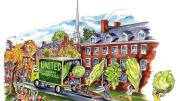1925
The Harvard Glee Club—winner a year earlier—withdraws from the annual intercollegiate competition at Carnegie Hall because of the musical inferiority of the selection (“Lamp in the West,” by H.W. Parker) chosen for all participants to sing.
1945
The Faculty of Arts and Sciences approves a general education program for the College; students must take at least two courses each in the natural and social sciences and the humanities.
1950
The Faculty Committee on Education Policy offers recommendations to improve undergraduate advising, which is “necessary for most students if they are to obtain maximum benefit from their college experience.” The report adds: “Advising, in a college which emphasizes independence, maturity, and self-education, will not be paternalistic.”
The new film Mystery Street (originally, Murder at Harvard) depicts police officer Ricardo Montalbán working with a forensics expert from Harvard’s department of legal medicine to catch a killer. For undergraduates, the movie’s primary draw is the 30-second opening shot in the Yard that boasts several recognizable fellow students as extras.
1970
Surprising students and faculty alike, administrative vice president L. Gard Wiggins announces that the University will buy only lettuce picked by members of the United Farm Workers—a change from its earlier policy of buying solely on the basis of quality, value, and supplies available. The decision ends a sustained effort by a small group of Harvardians to convince the University to boycott lettuce altogether.
1990
Eight students stage an overnight sit-in at University Hall, and some 60 more spend the night in sleeping bags outside, to protest the paucity of faculty members in Afro-American studies. Only one tenured professor is teaching during the fall term, as the department regroups following the unexpected death of its chairman, historian Nathan Huggins.
2010
With a four-inch plate screwed to his clavicle, Marco Iannuzzi ’11 pulls off an 84-yard kick return for a touchdown, igniting a second-half rally that boosts Harvard over Yale 28-21 for a fourth-straight victory. He had already returned one kickoff for a touchdown before breaking his collarbone in the season’s third game; his second return sets a Harvard record.









